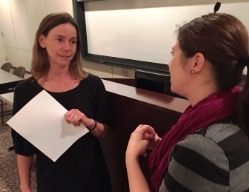Theorizing Gun Violence in Schools
 On October 25, the School of Education’s Cultural and Educational Policy Studies program hosted a public conference on “Theorizing Gun Violence in Schools,” featuring prominent philosophers of education from the United States, Canada, and Ireland. Approximately 40 people attended this full day of presentations on topics related to school shootings. School shootings are usually treated as exceptional events, out of keeping with the everyday practices of schooling, and the shooters seen as exceptionally troubled individuals, but the day’s presentations challenged that approach. Schools, presenters argued, are sites of tremendous hope, but those hopes are frequently disappointed, and students can be subjected to ordinary, taken-for-granted acts of violence. School shooters, other papers argued, are motivated by many of the same aspirations and fears as their peers except of course that the responses are tragic. Speakers took up the charge of understanding how schools can better respond to the vulnerability of students and teachers in a world that is always full of risk.
On October 25, the School of Education’s Cultural and Educational Policy Studies program hosted a public conference on “Theorizing Gun Violence in Schools,” featuring prominent philosophers of education from the United States, Canada, and Ireland. Approximately 40 people attended this full day of presentations on topics related to school shootings. School shootings are usually treated as exceptional events, out of keeping with the everyday practices of schooling, and the shooters seen as exceptionally troubled individuals, but the day’s presentations challenged that approach. Schools, presenters argued, are sites of tremendous hope, but those hopes are frequently disappointed, and students can be subjected to ordinary, taken-for-granted acts of violence. School shooters, other papers argued, are motivated by many of the same aspirations and fears as their peers except of course that the responses are tragic. Speakers took up the charge of understanding how schools can better respond to the vulnerability of students and teachers in a world that is always full of risk.
The conference was preceded by a two-day workshop, during which six of the presenters collaborated to prepare their papers for publication. The workshop, which like the conference was funded by a generous grant from the Spencer Foundation, followed over a year of dialogue among participants about gun violence in schools. Amy Shuffelton , Assistant Professor of Cultural and Educational Policy Studies and the conference convener, reports that the project began out of her dissatisfaction with media coverage of the school shooting at Sandy Hook elementary, which focused almost exclusively on two themes: gun availability and the shooters’ mental health. Although these are, she agrees, important concerns, Professor Shuffelton thought the cultural and educational foundations of school shootings called for further consideration by philosophers of education, whose work often addresses such related issues as the education of the emotions, events as spectacle, human vulnerability, gender conventions, and ethical justifications of school policy. Professor Shuffelton invited well-known scholars who have addressed these and other issues to participate in an ongoing inquiry into the ethical, political, and educational dimensions of gun violence in schools.